- Home
- Franz Kafka
The Burrow Page 8
The Burrow Read online
Page 8
Even so, the building could probably not have been carried out in any other way. To understand this, one should bear the following in mind: the wall was to serve as a protection for hundreds of years, so very methodical construction, use of the expertise of all known ages and peoples, continuing sense of personal responsibility of the workers, all these were givens. Lesser tasks might be performed by ignorant day-labourers drawn from the mass of the people – men, women and children – whoever applied for good money could be made use of, but even someone in charge of four day-labourers needed to be a qualified builder, a man capable of sensing what was at stake down to the roots of his being. And the greater the responsibility, the greater, evidently, the demands made of him. Such men were indeed available, albeit not in the numbers the project could have used. We had not approached the task in any way frivolously. Fifty years before the beginning of the construction, throughout the length and breadth of the China that was to be walled about, the art of building, and bricklaying in particular, had been declared a strategically valuable science, and all other things only inasmuch as they stood in some relation to it. I still remember very well how, as small toddlers, we stood in our teacher’s little garden and were told to build a wall of pebbles; the way the teacher wrapped the skirts of his coat about him, ran against our wall, of course knocked everything flying, and denounced us so bitterly for the feebleness of our work that we ran home crying to our parents. A tiny incident, but indicative of the mood of the times. I was fortunate in that, when I passed my final school exams at the age of twenty, the building of the wall was just beginning. I say fortunate because many others who had previously attained the apex of the education available to them, their heads full of grandiose building plans, found they had nothing to do and became useless drifters. But those who were able to join the project as foremen, albeit on the lowest grade, were genuinely worthy of the distinction. They were men who had done a lot of thinking about building and didn’t stop thinking about it either, who from the first stone they set in the earth felt, so to speak, at one with the construction. Such men were of course driven by the desire to give of their very best, as well as by an impatience to see the wall finally completed. The day-labourer was unacquainted with such impatience, he was driven only by his wages; also the higher-ups, yes, even middle-ranking engineers saw enough of the manifold growth of the project to keep their spirits resilient, but the foremen, intellectually vastly over-qualified for their apparently modest tasks, required care of a different sort. It wasn’t possible to take them and replant them, for instance, in some uninhabited mountain region hundreds of miles from their home, and have them set stones by the month or even by the year; the hopelessness of such assiduous, but even over a long life inconclusive labour would have rendered them desperate and reduced the value of their work. Hence the system of partial construction was adopted: five hundred yards could be completed in roughly five years, by the end of which the foremen would usually be exhausted and have lost all confidence in themselves, the construction and the world in general; then, while they were still feeling the elation of the celebrations of the coming together of the thousand yards, they were sent somewhere far away, saw on their travels occasional completed parts of the Wall soar up, passed through the quarters of senior managers, who presented them with official medals, heard the cheers of the new armies of labourers streaming out from the interior, saw forests levelled for scaffolding, saw mountains quarried to stones, heard in the holy sites the songs of the faithful praying for the successful completion of the construction – and all this soothed their impatience; the quiet domesticity to which they had been temporarily restored strengthened them; the high regard in which everyone associated with the project stood, the fervour and humility with which their reminiscences were listened to, the trust that the quiet ordinary citizen put in the ultimate completion of the Wall, all this kept the strings of their souls taut. Like eternally optimistic children, they said goodbye to home, their desire to do the people’s work became irresistible, they left home earlier than they had to, half the village accompanied them, on all the roads there were farewells, banners and flags, never before had they seen how rich and beautiful and large and admirable their country was, every fellow citizen was a brother, for whom they were building the protective wall and who would thank them with everything they had and for as long as they lived, Unity, Unity, shoulder to shoulder, a popular dance, blood, no longer trapped in the sluggish circulation of a single body, but rolling sweetly and endlessly through our illimitable China.
And that was the explanation for the system of partial construction, but there were other reasons for it besides. Nor is it odd that I should spend so much time debating this issue – however specialized it may at first appear, it’s close to the heart of the whole project. If I am to give a sense of the thinking and the experience of those times, then it is not possible to investigate this particular matter too deeply.
It is surely correct to say that feats were accomplished at that time that bear comparison to the Tower of Babel, though in terms of pleasingness to God, at least as far as we humans can tell, they had the opposite tendency. I say as much, because early on during the construction a scholar published a book in which the comparison was specifically made. He tried to argue that the Tower of Babel remained uncompleted not because of the generally claimed reasons, or at least those were not the major ones. His evidence came not from writings and reports; rather, he pursued his investigations on location. In the course of them he found that the structure suffered from weakness in its foundations and was therefore doomed to collapse. In this respect at least, our time was far superior to that distant era: almost every educated person was a professional mason and an expert in the science of foundations. This was not the scholar’s objective, though; instead he claimed that the Great Wall would for the first time in history make a sure foundation for a new Tower of Babel. First the Wall, and then the Tower. The book was in everyone’s hands at the time, but I must confess that even today I don’t quite understand how he conceived of his Tower. Our Wall, which was not even circular, but at best a sort of quarter- or semicircle, was to make the foundations for a tower? That could only be meant in a sort of figurative way. But then what of the actual Wall, which was the outcome of the endeavours and the lives of hundreds of thousands? And why did the work come with blueprints, admittedly rather vague, in which the Tower was sketched, and suggestions – quite detailed, at times – as to how the strength of our people might be brought to bear on the new project? There was a lot of confusion at the time – that book is only one example – perhaps because the attempt was being made to focus the efforts of so many on one objective. Human nature, ultimately footloose as it is, of the quality of a puff of dust, will not stand for much in the way of commitment; if it finds itself committed, then it will shake at its fetters like mad, and will ultimately tear apart wall and chain and itself and scatter everything to the four winds.
It is possible that these arguments, ultimately against the building of the Wall, were then incorporated by the leadership in their strategy of partial construction. It was only when we – and I speak in the name of many others here – when we puzzled out the instructions of senior management that we got to know ourselves and found that without their leadership neither our training nor our psychological gifts would have been enough even for the tiny part we took up in the whole. In the counsels of management – no one I asked knew or knows where they met or who was there – but surely all human thoughts and drives were weighed in these counsels, and balanced against them all human aims and fulfilments; while through the window the reflection of divine worlds fell on our leaders’ hands as they drew up their plans.
And so the honest observer refuses to believe that the leadership, if they had seriously purposed such a thing, could not also have surmounted those difficulties attendant on a holistically conceived Wall. There remains only the conclusion that the leadership had set its heart on the method of p
artial building. But partial building was a makeshift tactic and not really fit for purpose. So the leadership wanted something not fit for purpose. A curious conclusion, I daresay. And yet it has some things going for it too. It may be possible today to talk of it without danger. At that time it was a secret principle of many, among them many of the best: try with all your might to understand the orders of the leadership, but only up to a certain point, and then stop thinking. A sensible principle that also found expression in a parable that later gained currency: stop thinking, not because it could harm you; stop thinking because it is by no means certain that it could harm you. It is wrong in fact to speak of things as harming or not-harming. You will be as the river in spring. Its level rises, it gets bigger and stronger, it irrigates the land beyond its banks more effectively, it keeps more of its own being further out to sea, it will resemble the sea and be more welcome to it. To that extent, try to follow the orders of the leadership. But then the river bursts its banks, loses form and definition, slows its current, seeks against its nature to form little inland lakes and damages pastureland; and yet in the long run it fails to keep its present extent, but retreats to its original course; yes, in the ensuing dry spell it even starts to shrink miserably: do not try to think through the instructions of the leadership to that degree.
Now this comparison may have been extraordinarily relevant during the time of the construction of the Wall, but for my present report it is of limited use. The nature of my investigation is historical; the storm clouds have long since scattered and produce no more lightning, and I am free to seek an explanation for the partial construction that goes beyond the one with which we had to content ourselves at the time. The bounds of my thinking are narrow enough, while the terrain they flow through is limitless.
Now, against whom was the Great Wall supposed to afford protection? Against the peoples of the north. I come from the south-east of China. No northern peoples menace us here. We read about them in old books; the cruel acts their nature compels them to commit cause us to sigh in our peaceful pergolas; in paintings from life we see the devilish faces, the gaping mouths, the jaws studded with teeth sharpened to a point, the slits of eyes that seem to narrow at the prospect of loot which they will rend and grind in their mouths. If our children are restive, we show them such pictures and they fling themselves crying around our necks. But that is all we know of these Northerners. We have never seen them, nor will we ever see them if we remain in our villages, even if they drive and whip their wild horses straight towards us; the country is too big and won’t give them access to us, they will be scattered in the empty air.
So, if all this is the case, why do we leave our homes, our rivers and bridges, our mothers and fathers, our weeping spouses, our children who need instruction, and move away to study in the faraway city, and our thoughts still further away, with the Wall to the north. Why? Ask our leaders. They know us. They, who grapple with huge anxieties, know us, know our small businesses, see us huddle together in our low huts, and the prayer the head of household says in the evening in the circle of the family either pleases or displeases them. And if I may be permitted such a thought about our leadership, then I must say, in my opinion the leadership was pre-existent – they did not come together like a group of high mandarins, stimulated by a happy morning dream, hurriedly summoned to a session, hurriedly taking a decision, and later that evening the populace drummed out of bed to carry out the decisions, even if it was merely to put on a show of fireworks to the glory of a divinity who yesterday showed favour to the gentlemen, only the next day, no sooner are the paper lanterns extinguished, to have them beaten up in a dark corner somewhere. The leadership has always existed, and the decision to build the Wall likewise.
My field of study during the building of the Wall and subsequent to it, right up to the present day, has been comparative ethnography – there are certain questions one can only get at by this means – and I have discovered that while we Chinese have certain popular national institutions in a uniquely clear form, we have others in unique obscurity. I have always wondered why, about the latter especially, and the building of the Wall is closely involved with these questions.
Among our murky institutions, one of the murkiest is certainly the Empire itself. In Peking, of course, and certainly at court, there may be some clarity on the subject, though that too is more apparent than actual: university professors of constitutional law and history claim to know all about these things, and to be able to transmit their knowledge to their students; and the further down the educational scale one goes, the more, reasonably enough, doubts disappear as to one’s own knowledge, and a kind of quasi-education washes around a few centuries-old statements that may have lost nothing of their eternal verity, but remain permanently indistinct in the haze and fog that enshroud them.
But of all things, the Empire is in my view something the people need to understand, seeing as they are where ultimately it draws its support. Here I am, once again, only qualified to talk about my home district. Apart from the agricultural deities and their worship that so variously and beautifully fills the calendar, all our thinking has always been focused on the Emperor. But not the current incumbent, or, if you like, him as well, if we had known him, or even the least thing about him. We were always at pains – it was the only curiosity we knew – to discover something about him. But, odd as it may sound, it was scarcely possible to learn anything: not from the pilgrims who crisscross our country or in nearby or distant villages; not from the sailors who come down not just our little local rivulet but the great and holy arteries of the land. That is, we were told many things, but received little information. So great is our country, no fairy tale can match its greatness – the heavens can barely stretch to cover it. And Peking itself is just a dot, the imperial palace a smaller dot. Admittedly, the Emperor as a concept looms as large as all the storeys of the world. The living Emperor, though, is a human being no different from ourselves: he lies as we do in a bed, perhaps more lavishly proportioned, but still comparatively narrow and short. Just like us, he likes to have a good stretch, and if he happens to be very tired, then he yawns with his delicately shaped mouth. But how would we hear about it thousands of miles to the south, almost as far as the Tibetan plateau? Besides, any news, even if it were to reach us, would come far too late, would be long since out of date. The Emperor is clustered about with the shining and yet somehow opaque mass of the court, which is the counterweight to the Empire, and always trying with its poisoned arrows to shoot the Emperor off his perch. The Empire is immortal, but an individual Emperor may fall and die; even whole dynasties finally collapse and breathe their last in the death rattle of a single individual. Of such battles and sufferings the people will never get to hear – like strangers in a city, like latecomers, they stand at the back of densely crowded side streets, calmly eating their packed lunches, while a long way in front of them on the market square the execution of their overlord is in progress.
There is a legend that admirably sums up the relationship. The Emperor has, so it is claimed, sent you a message on his deathbed, to you – you alone, you miserable subject, the tiny shadow fleeing as far as it can from the imperial sun. He has asked the messenger to kneel down at his bedside and whispered the message in his ear; and it mattered to him so much that he had the man say it back to him. By nodding, he affirmed that that was what he had said. And before all the massed spectators at his dying – all the obstructing walls have been knocked through and on the wide and lofty staircase the great figures of the Empire stand in a circle – with all these people watching, he has dispatched his envoy. The envoy set off without delay, a strong man, tireless, a champion swimmer; now putting out one arm, now the other, he clears a way through the crowd; if he encounters resistance, he points to the emblem of the sun displayed on his chest; he gets ahead easily, better than anyone else. But the crowds are so great; their abodes are never-ending. If a path opened before him, how he would fly, and ere long you would hear th
e majestic pounding of his fists on your door. But instead, how futile are his efforts; still he is forcing his way through the apartments of the inner palace; never will he have put them behind him; and if he succeeded there, still nothing would have been won; he would have to cross the courtyards; and after the courtyards, the second, outer palace; further staircases and courtyards; another palace; and so on for thousands of years; and once he finally plunged through the outermost gate – but this can never be – then the imperial city would still lie ahead of him, the centre of the world, piled high with its detritus. No one can make his way through there, much less with a message from a dead man to one of no consequence. Meanwhile, you will sit at your window and dream of it as evening falls.
In just this way, with this mixture of hope and hopelessness, do our people view the Emperor. They don’t know which Emperor is ruling, and there are even some doubts as to the name of the dynasty. At school, many such things are learned parrot-fashion, and the general uncertainty in this regard is so great that even the best pupil is drawn into it. In our villages, long since deceased emperors are returned to the throne, and one who lives on only in song recently issued a proclamation, which the priest read aloud at the altar. Battles from our pre-history are being fought now, and with shining cheeks the neighbour charges into your house with the news. The imperial womenfolk, over-stuffed on over-stuffed cushions, seduced away from the old moralities by canny flatterers, swelling in bossiness, excitable with greed, sprawling in lust, rehearse their misdeeds; the more time has passed, the more garishly all the colours shine, and with loud lamentations the village one day gets to hear how thousands of years ago, an Empress once drank her husband’s blood in great draughts.

 Diaries of Franz Kafka
Diaries of Franz Kafka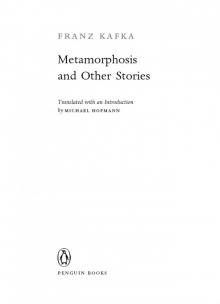 Metamorphosis and Other Stories
Metamorphosis and Other Stories The Castle: A New Translation Based on the Restored Text
The Castle: A New Translation Based on the Restored Text The Complete Stories
The Complete Stories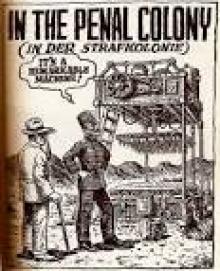 In the Penal Colony
In the Penal Colony The Trial
The Trial Amerika
Amerika The Burrow: Posthumously Published Short Fiction
The Burrow: Posthumously Published Short Fiction Sons
Sons Letters to Milena
Letters to Milena Investigations of a Dog: And Other Creatures
Investigations of a Dog: And Other Creatures Collected Stories
Collected Stories The Great Wall of China
The Great Wall of China The Burrow
The Burrow The Castle
The Castle The Meowmorphosis
The Meowmorphosis The Sons
The Sons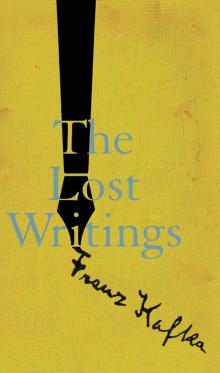 The Lost Writings
The Lost Writings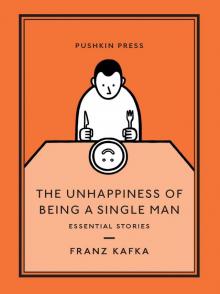 The Unhappiness of Being a Single Man
The Unhappiness of Being a Single Man Amerika: The Missing Person: A New Translation, Based on the Restored Text
Amerika: The Missing Person: A New Translation, Based on the Restored Text The Burrow: Posthumously Published Short Fiction (Penguin Modern Classics)
The Burrow: Posthumously Published Short Fiction (Penguin Modern Classics) The Diaries of Franz Kafka
The Diaries of Franz Kafka Investigations of a Dog
Investigations of a Dog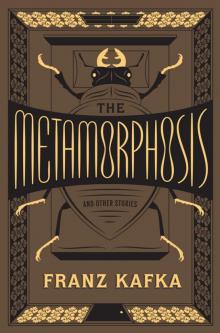 The Metamorphosis and Other Stories
The Metamorphosis and Other Stories The Trial: A New Translation Based on the Restored Text
The Trial: A New Translation Based on the Restored Text